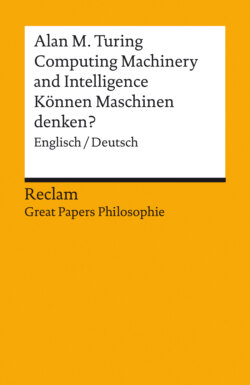Читать книгу Computing Machinery and Intelligence / Können Maschinen denken? (Englisch/Deutsch) - Alan M. Turing - Страница 7
На сайте Литреса книга снята с продажи.
3. The Machines concerned in the Game.
ОглавлениеThe question which we put in § 1 will not be quite definite until we have specified what we mean by the word ‘machine’. It is natural that we should wish to permit every kind of engineering technique to be used in our machines. We also wish to allow the possibility that an engineer or team of engineers may construct a machine which works, but whose manner of operation cannot be satisfactorily described by its constructors because they have applied a method which is largely experimental. Finally, we wish to exclude from the machines men born in the usual manner. It is difficult to frame the definitions so as to satisfy these three conditions. One might for instance insist that the team of [436] engineers should be all of one sex, but this would not really be satisfactory, for it is probably possible to rear a complete individual from a single cell of the skin (say) of a man. To do so would be a feat of biological technique deserving of the very highest praise, but we would [16]not be inclined to regard it as a case of ‘constructing a thinking machine’. This prompts us to abandon the requirement that every kind of technique should be permitted. We are the more ready to do so in view of the fact that the present interest in ‘thinking machines’ has been aroused by a particular kind of machine, usually called an ‘electronic computer’ or ‘digital computer’. Following this suggestion we only permit digital computers to take part in our game.
This restriction appears at first sight to be a very drastic one. I shall attempt to show that it is not so in reality. To do this necessitates a short account of the nature and properties of these computers.
It may also be said that this identification of machines with digital computers, like our criterion for ‘thinking’, will only be unsatisfactory if (contrary to my belief), it turns out that digital computers are unable to give a good showing in the game.
There are already a number of digital computers in working order, and it may be asked, ‘Why not try the experiment straight away? It would be easy to satisfy the conditions of the game. A number of interrogators could be used, and statistics compiled to show how often the right identification was given.’ The short answer is that we are not asking whether all digital computers would do well in the game nor whether the computers at present available would do well, but whether there are imaginable computers which would do well. But this is only the short answer. We shall see this question in a different light later.
